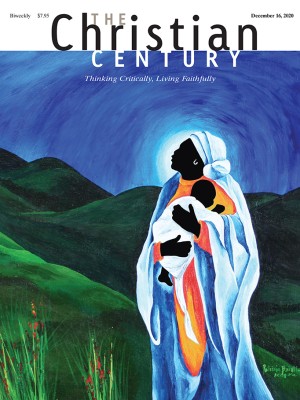Isolated for the holidays? You should feast anyway.
Even during a pandemic, feasting is central to Christian worship.

In his docuseries Cooked, based on his award-winning book by the same name, Michael Pollan sets out to show viewers the importance of tradition and ritual in cooking. The first episode, “Fire,” follows both the Martu people in Western Australia and a family of pitmasters in North Carolina. From the Martu, who have been living on a Western diet for only the past 60 years or so, we learn about the many health problems that arose when they turned from their traditional ways. When they returned on weekends to the bush and to their old ways of eating and cooking, many of those health problems subsided.
In North Carolina, Pollan focuses his attention on pitmaster Ed Mitchell, a Black man whose ancestors served as pit boys on the plantations where they were enslaved. Many others play a hand in hunting and preparing a pig for a barbecue, but it is the pitmaster who cooks it and serves it to his people. Pollan describes Mitchell almost in the terms of an Anglo-Saxon king who, after a war, redistributed the plunder to his people. The process is steeped in tradition and ritual, and it culminates in a feast. The barbecuing of a whole pig is a days-long process, one that involves a large amount of drinking and singing through the night until the pig is ready for the party the next day.
Read our latest issue or browse back issues.
“When we learned to cook is when we became truly human,” Pollan says at one point. The point echoes anthropologist Richard Wrangham, who said that Homo erectus “evolved when an ape learned to cook.” Pollan spends much of the first episode of Cooked hammering home this notion. Cooking and feasting are part of the primal human experience, and Pollan values the importance of tradition and ritual, even when describing the certain amount of bullshit that happens around the fire during a barbecue.
Philosopher Josef Pieper also explores the notion of the primacy of cooking to humanity and of handing on the traditions and rituals of cooking. In Leisure: The Basis of Culture, he argues that all cultures have at their root leisure. For Pieper, leisure does not mean idleness; rather, leisure is related to celebration, to anything done for its own sake and not for the sake of some utility.
For instance, we bake bread at least in part for its utility. For many of the poor around the world, bread and other grain-based foods are staples. Yet, as a species, we didn’t stop with bread. We made cake, something utterly superfluous. We do not need cake. It is the definition of gratuity. We make it because it tastes good, because it is beautiful. But we also make cake to celebrate. And Pieper says the ultimate reason humans celebrate, why we feast, is to worship.
Pollan sees cooking as definitive to the human experience; Pieper sees it as central to religious worship. For Pieper, a Roman Catholic, the ultimate form of divine worship is the Eucharist, a meal at which we are spiritually nourished with actual food. But anthropological evidence of the connection between food and worship can be seen even in the caves where ancient humans once lived. Under the cave drawings, researchers have found evidence of ritualistic sacrifice. The cave dwellers seem to have offered up portions of their hunt to the gods of the beasts as a sacrifice of thanksgiving and for the hope of good hunts to come.
Angel F. Méndez Montoya also connects communal eating with worship in The Theology of Food. The book begins with an exploration of the cooking in his own home as a child, culminating in a recipe for a traditional Mexican molé. But toward the end of the book he writes that “the political reality of alimentation reflects, among other factors, the willingness and capacity of individuals and societies to express solidarity by sharing food.” A feast, properly speaking, is a meal shared—and for Christians who are called to look after the poor and disenfranchised, it means a meal shared not only among our families but with the suffering.
Normally, at this time of year, we’d be planning gatherings with our friends and family to celebrate traditional holiday meals. But as the nights grow longer, we are still living in the shadow of a pandemic. Many of us will be isolated or forced to make tough decisions about whether or not we can gather with family this year. In the midst of all this darkness, I imagine some are thinking it just isn’t the right time for a feast.
I disagree. With the coming of so many traditional celebrations in the church’s liturgical calendar, we are called to feast and even to celebrate. It isn’t simply the human thing to do, it is the profoundly Christian thing to do, even in a time of scarcity and suffering. Let me offer one more example from classic literature.
In A Christmas Carol, the Ghost of Christmas Present pours incense from his torch onto the meals of those celebrating the birth of Christ. Scrooge then asks the spirit a question:
“Is there a peculiar flavour in what you sprinkle from your torch?” asked Scrooge.
“There is. My own.”
“Would it apply to any kind of dinner on this day?” asked Scrooge.
“To any kindly given. To a poor one most.”
“Why to a poor one most?” asked Scrooge.
“Because it needs it most.”
Dickens, known for his focus on the plight of the poor, reaches his apotheosis here. The best feast is not necessarily the one with the richest or best ingredients but the one kindly given, with a priority given to the poor meal. The poor meal is prioritized precisely because it is a meal that is given out of want and not out of excess.
When Mrs. Cratchit brings out dessert after the Christmas goose has been eaten down to the bones, she worries it won’t be enough. But no one complains; everyone has had just enough, even if they had to eke out their meal with applesauce. Then Scrooge arrives, taking over the role of the Spirit of Christmas Present, but instead of incense from a torch, he gives from his excess and provides the Cratchits with an enormous turkey. He blesses their feast not because he is their superior, but because in many ways he is their inferior, a fact he learns when observing their celebration. He has made a sacred offering.
That scene reminds me of John Chrysostom, who says that “the theft of the poor is in your houses.” We may be called to shelter in place for these holidays, but if we forget those in need, we do so at our peril.
So feast, throw a party, even if only you can safely attend. Crack open that bottle of scotch you’ve been holding onto. Have some good wine and cheese or your favorite pizza. Remember your humanity—and remember that the church has called us to celebrate together what is sacred. Share, in whatever way you can, the spirit of Christian feasting with others. For Christ did not come into a rich family but a poor one, and like the Ghost of Christmas Present he tips his torch to our most humble offerings, uniting his divinity, his excess, to our humanity.
A version of this article appears in the print edition under the title “Go ahead and feast.”





